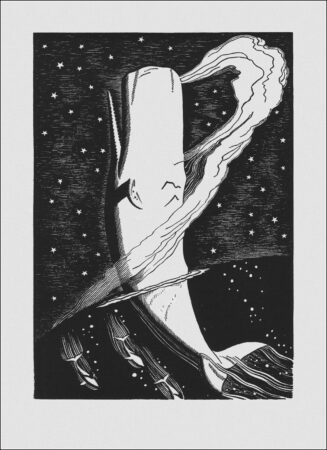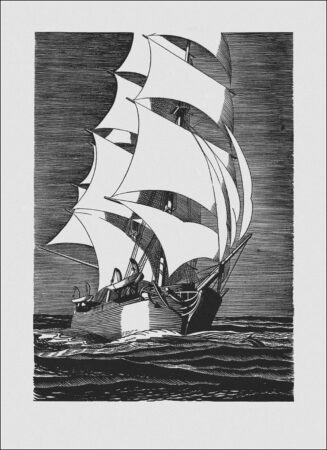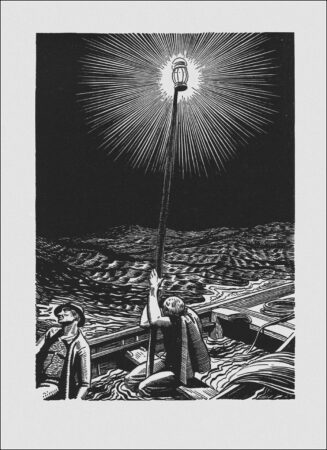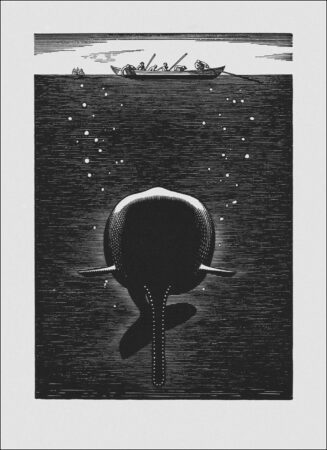A few months ago, I embarked upon my Salty Sea-Dog Era of reading, have been reviewing the progress thus far, and so we come to Moby-Dick. Herman Melville’s sublime, layered exploration of obsession and vengeance may be the most famous American novel ever written, and as such, the prospect of reviewing something people have themselves been obsessing about for well over a century is somewhat daunting. In an early review, London publication Morning Advertiser‘s anonymous reviewer opined: “To convey an adequate idea of a book of such various merits… is impossible in the scope of a review.” There is little to be said about Moby-Dick that has not already been explored ad nauseum, but I spent a couple months reading the damn thing, so I should probably record some thoughts, if only for posterity.

I used the words obsession and vengeance above as a shorthand for the themes of Moby-Dick, and indeed, they are quite prominently featured in the text, but the thing about Moby-Dick is that it’s notoriously difficult to pin down. Like the sea that Melville aptly describes throughout the novel, there are numerous thematic undercurrents and tidal forces at work underneath the surface levels of the novel.

Take obsession, one of the more obvious and famous themes of the book, usually attributed to captain Ahab’s mad quest for revenge on the white whale that took his leg on a previous voyage. It’s certainly presented early on, but quickly takes a back seat to another form of obsession; that of Melville’s interest in whales and whaling. We’re frequently presented with an almost non-fictional survey of knowledge about whales, ranging from an analysis of historical artwork used to depict whales, to a catalog of mythological references to whales (including from Greek, Roman, Hebrew, and Hindu literature, with obvious focus on the story of Jonah), to various culinary considerations (including this bit of irony in Chapter 65: “Stubb, he eats the whale by its own light, does he? and that is adding insult to injury, is it?”), to biological taxonomies of whales, to countless other digressions on the art of whale hunting. Only a man in the grip of obsession could compile and write such a thing.

So it goes with other various themes. Ahab’s fruitless thirst for vengeance is infamous, but while it is brought up early on, it only becomes truly prominent during the final sequence of the novel. Melville, though, is clearly concerned with epistemology and perception; with the difficulty of observation and knowledge. This is demonstrated through his aforementioned digressions on non-fictional topics, many of which may seem a bit quaint to modern audiences. We’ve grown up with exquisite underwater photography of all manner of sea life, not just whales and sharks, so it’s easy to underestimate how difficult it was to piece this sort of thing together in 1851, when Melville was talking about old paintings as the primary source of what a whale looks like. Also interesting are Melville’s love of seafaring, defense of whaling, and justifications of its excess. Whole chapters are devoted to such, and surely caused an escalation in the hot take industrial complex of its day. I could spend years cataloguing the themes of Moby-Dick, probing and teasing out theories on religion, race, philosophy, and the like (this sort of inspired study in its readers being, in itself, yet another layer of the theme of obsession).
As you might gather from the above, this is not exactly an easy-going read. The overarching story itself is quite simple, but the language and style are complex and frustratingly beautiful at times. There’s an almost poetic, dreamlike quality to the whole affair that is difficult to pin down, and can lend itself to an trance-like reading state. You read a page or two, realize that you have no idea what’s going on, but then when you go back and reread the page, you find that you’ve absorbed it in some ways, but not in others. It’s a very odd and challenging read in that way, and I must admit that I’m sure some of this went over my head.

Another stray thought about the numerous digressions in this book: I don’t want to hear anyone complain about Science Fiction’s propensity towards info-dumps ever again. Sure, most SF writers don’t have the facility with language and stylistic prose that Melville does, but if this book can spend hundreds of pages going off on non-fictional tangents and yet still be one of the canonical candidates for Great American Novel, so can Science Fiction. If Nostromo represents literary fiction’s propensity towards worldbuilding (a la high-fantasy epics like Lord of the Rings), then Moby-Dick represents literary fiction’s propensity towards info-dumps and tangents (a la science fiction epics like Dune or Neal Stephenson’s entire bibliography).
One final note on editions. As a book in the public domain, Moby-Dick is available in numerous different editions, including plenty of free digital copies. I looked around and settled on the Third Norton Critical Edition, mostly because it contains a huge amount of supplementary material. And the material is great! Like Melville’s obsessive study of all things whaling, people have been hunting down supplementary materials like Melville’s correspondence, biographical material, and even old reviews from nearly forgotten publications. New material is still being discovered to this day (or, at least, until 2018, when this edition was published), and while my “obsession” with has not reached the fervor with which those who compiled this information have, I did sample some of it, and it’s quite interesting. That being said, this book is almost certainly not the greatest. In particular, the paper it’s printed on is way too thin, making it difficult to handle and more importantly, some of the ink bleeds through to the other side, making it difficult to read. As already mentioned, there are countless other editions that are invariably cheaper than this one, so if you are going to read Moby-Dick, I suggest maybe seeking them out. If you become obsessed and want an exhaustive resource of supplementary material, then maybe jump on that Norton edition.